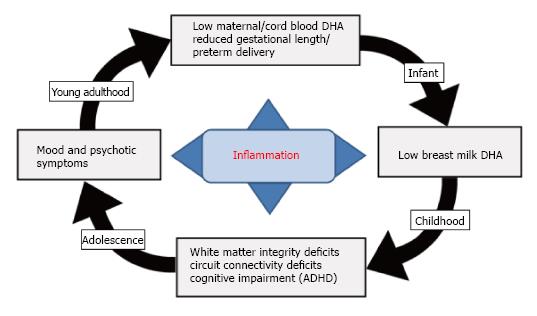Copyright
©The Author(s) 2015.
World J Psychiatr. Mar 22, 2015; 5(1): 15-34
Published online Mar 22, 2015. doi: 10.5498/wjp.v5.i1.15
Published online Mar 22, 2015. doi: 10.5498/wjp.v5.i1.15
Figure 4 Diagram illustrating a hypothetical role of LCn-3 fatty acid deficiency in the familial transmission of psychopathology.
Adolescent and young adult females with mood disorders exhibit significant blood DHA deficits leading to reduced fetal (cord blood) DHA accrual during pregnancy. Low maternal DHA status during pregnancy also increases risk for preterm delivery due in part to elevated pro-inflammatory cytokine levels, as well as low breast milk DHA levels postpartum. Uncorrected deficits in fetal brain DHA accrual lead to long-standing deficits in white matter resilience and integrity and reduced functional connectivity in fronto-striatal circuits and increase risk of developing ADHD symptoms in childhood. Deficits in white matter integrity and reduced functional connectivity in fronto-limbic circuits during adolescent development is associated with the emergence of emotional and/or thought dysregulation and the onset of mood and/or psychotic symptoms. DHA: Docosahexaenoic acid; ADHD: Attention deficit/hyperactivity disorder.
- Citation: McNamara RK, Vannest JJ, Valentine CJ. Role of perinatal long-chain omega-3 fatty acids in cortical circuit maturation: Mechanisms and implications for psychopathology. World J Psychiatr 2015; 5(1): 15-34
- URL: https://www.wjgnet.com/2220-3206/full/v5/i1/15.htm
- DOI: https://dx.doi.org/10.5498/wjp.v5.i1.15









